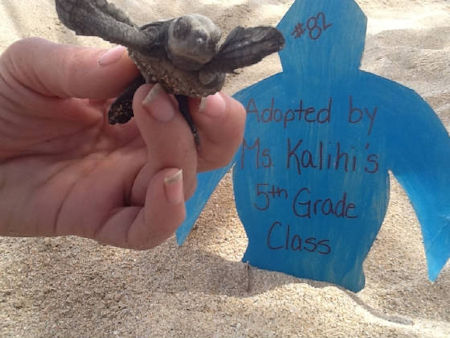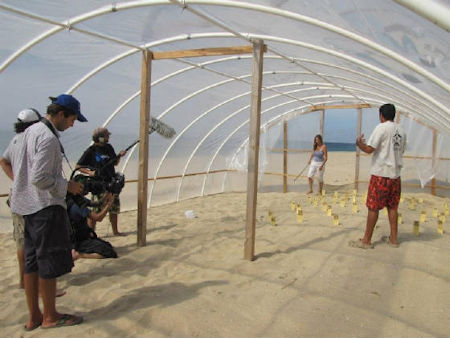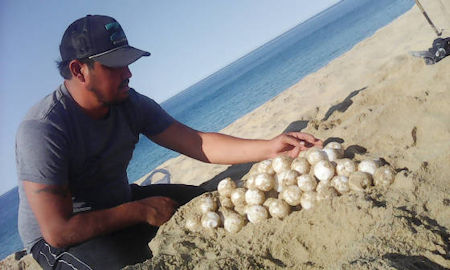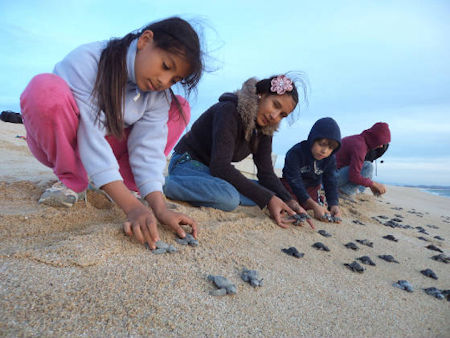 |  |
By Martina

In Todos Santos the nonprofit organization Tortugueros Las Playitas offers you an “Eco adventure of a lifetime.” Turn a vacation into something unique and gratifying no matter your age. Young or old, this experience will change your life. The mission here is to “protect, conserve and replenish the fragile marine eco-systems” with an interest on habitat protection, education and community outreach. A visit to their wonderful website will entice you with great videos and many details of all the opportunities which are involved according to the time of migration and birthing cycle. “Three species of endangered sea turtles nest on the beaches of Todos Santos: Olive Ridley, the critically endangered Leatherback, and occasionally the black sea turtle.” If you plan your eco-vacation in October, the great mother Leatherback, weighing 1,500 pounds, arrives. She will come to the beach 4 to 7 times to lay her clutches of 90 eggs per season. The temperature of the sand has to be held consistent. It is necessary to keep the proper temperature for a “successful incubation.” An interesting and little known fact is that the temperature inside the nest determines the sex of the hatchling. Temperatures are monitored to make sure it does not drop below 26 degrees Celsius, 80 degrees Fahrenheit. As a volunteer you might be on the beach at night as the mothers come in to scoop out the sand to deposit the eggs. Volunteers are there to protect and to make sure no late night ATV disturbs the birthing. A sad fact is that only one in a thousand leatherback hatchlings survive to adulthood. The Leatherbacks have been on this planet for one hundred ten million years. Sadly, it is man who has brought them to the brink of extinction in less than a hundred.

If the temperture in the sand begins to drop, the eggs must be moved into the incubation greenhouse. Just like for fragile plants, the greenhouse stabilizes temperatures and significantly decreases the occurrence of possible deformations during incubation. The technology used in the greenhouse also allows the staff to research the “gender ratios of nests.” You might be asked to be part of moving the eggs to a green house. The staff works out an individual program designed to fit each person’s needs. If you want to be there for what is called the “release,” this happens between December and April when the little ones begin to pop out of the sand. Inside the green house, they are hand carried to the water’s edge. If from the beach, they are escorted and protected from the shore birds who wait to feast on the little morsels. Amazingly, this program incubates about 10,000 endangered eggs in one year.
Very cute volunteer casitas are available between the beach and the town of Todos Santos and are within walking distance to markets. There is a common eating area in a large palapa style kitchen. How fun is that! Just imagine the excited conversation around the table. Reservations for these and for the eco tours can be arranged on the website. The tours can be arranged to swim with the whale sharks or to take an island tour. But if you cannot make it all the way to Baja Sur, have heart and participate in the Adopt a Turtle opportunity, which of course goes to keep this organization alive.

Now if Land’s End is your heart’s desire, Chris Sands, author, freelance writer and full time resident of Los Cabos, stated in a recent Baja.com article that the increasing resort development is a major problem. “The harsh light that shines out on the beaches from hotels and housing developments disorients the fledgling sea turtles, and often leads them in the wrong direction. As such, hatchling nursery programs have become hugely important in improving sea turtle survival rates.”
San Cristobal Nature Preserve is a 2,000-acre protected area which covers several Pacific-side beaches north of Cabo San Lucas. This is a non-profit group called Association for the Protection of the Environment and the Marine Turtle in Southern Baja or ASUPMATOMA. Here they offer similar types of volunteer opportunities. There is the need for night patrol, July 1 to October 30. Volunteers spend a night camping and patrolling with the marine biologists. They also have educational programs geared towards children. By adopting a baby turtle September 1st to December 15th, a child will be able to name their adopted turtle before it is released to the ocean. The child is then given an adoption certificate with their name, the adopted turtle's name and the release date. Another level of donation is adopting a whole nest, protecting the entire sea turtle family. What an inspiring family or school educational opportunity.

These are such important times for our planet and for all who live upon her. It is not too far off base to consider that the sea turtles are the ocean’s ambassadors, for they tell us about the health of the oceans. It is known how toxic plastic is to the environment. Yet not so well known is how this directly affects the sea turtles. Leatherbacks eat primarily jellyfish. This extremely important role keeps the jellyfish population in balance. Floating plastic bags look like jellyfish and when they are ingested they become life threatening. Even though we may never see this wonder of a birthing sea turtle, we can be a part of the protection by saying no to plastic bags. This is no small contribution to the welfare of these ancient creatures of the sea.
References:
Tortugueros Las Playitas
ASUPMATOMA
Wikipedia: Plastic Bag/ The Great Pacific Garbage Patch
National Geographic
Baja.ca
Martina's email: mteomaya(at)gmail.com

Great customer service, quick, friendly staff helpfully answered all questions, very patient with...

Easy to understand and great customer service. Emailed Michelle with some concerns I had about a...

Easiest way to purchase insurance when traveling to Mexico. I have used their service for the last...